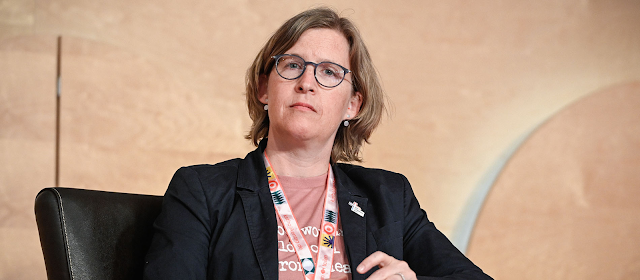God's strong daughters speak out at Mini-Feminist World Synod
Conference shows unity on women's issues in the church
"God's strong daughters" speak out
Renowned women theologians spent two days discussing the so-called women's issue in the Catholic Church. Voices from all continents made it clear that the call for more gender justice is growing worldwide.
Julia Knop, Professor of Dogmatics in Erfurt, dispelled a persistent prejudice right at the beginning of the international conference: "Standing up for gender justice in church and society is not a luxury of western societies, not neo-colonialism towards cultures that should not be expected to accept the equality of women." Representatives from all continents showed with impressive statements how pronounced the desire for more participation of women in the Catholic Church is worldwide.
Cathcon: The influence of (radical) Synodalists worldwide is limited to academic faculties. It is German neo-ecclesiastical colonialism being imposed on non-European churches.
Around 500 people took part in the conference "God's Strong Daughters", organised by the Catholic Academy of the Diocese of Dresden-Meissen and the Catholic Faculty of the University of Erfurt, on Monday and Tuesday, either digitally or live in Leipzig. Among them were numerous renowned experts and pioneers as well as women in church leadership positions, such as the French theologian Nathalie Becquart from the Vatican Synod Secretariat and the Secretary General of the German Bishops' Conference, Beate Gilles.
"Small feminist world synod"
"This is something like a small feminist world synod," said Ute Leimgruber, Professor of Pastoral theology in Regensburg. And without a doubt, the meeting made it clear that women worldwide are not a homogeneous group. They also have different views, for example, on the question of women's access to ordained ministry and whether new structures are needed in the Church.
However, there was unanimity in the criticism that women are discriminated against in the Church and that Catholics worldwide expect more gender justice from their Church, as evidenced not least by the feedback on the upcoming World Synod.
In countries where machismo is very pronounced, as in Latin America, this is particularly difficult to enforce, explained Theology Professor Birgit Weiler of the Jesuit University in Lima (Peru). At the same time, she urged to talk more about positive experiences and initiatives. In Latin America, she said, there are bishops who have already commissioned individual women to lead, baptise and marry congregations. "And they are earning great respect for this on the ground. It is simply the time to open spaces."
Nigerian professor and religious Caroline Mbonu stressed, "For us African women, spirituality is very important. But some debates about women's priesthood seem a bit sterile-theoretical to us." The culture of her country certainly knows women priests, and there is an openness to accept this in the church as well. "We should perhaps talk more about the spirituality of God's people on the way there and not just look for the perfect theology."
"Don't fall into bitterness"
Theologian Virginia Saldanha of India's Catholic Council of Women highlighted the importance of theological education, saying, "Many women in Asia are not aware of their equal dignity and baptismal grace. The priest is the leading figure to follow." Paternalism and clericalism have even become stronger again, he said. "Priests still exercise a dominant style of leadership and see women as helpers, but not as equal disciples," Saldanha said.
The momentum of vision is lost under the pressure of clericalism, the almost 80-year-old regretted. In addition, she said, "If you make it clear as a theologian that you are a feminist, you are out of the game and in danger of losing your job." This is an experience that German female university theologians also describe.
The commitment to more gender justice in the church is a tough business, as became clear at the conference. Participants repeatedly emphasised how immense the forces of perseverance are and how important mutual support is. The former Protestant Bishop Ilse Junkermann encouraged participants not to become embittered: "I can also tell you a long story of illness, which has occupied and shaped me for a very long time. But it was a very important key experience for me to say: The others do not make me a victim. I am not a victim."










.jpeg)

Comments